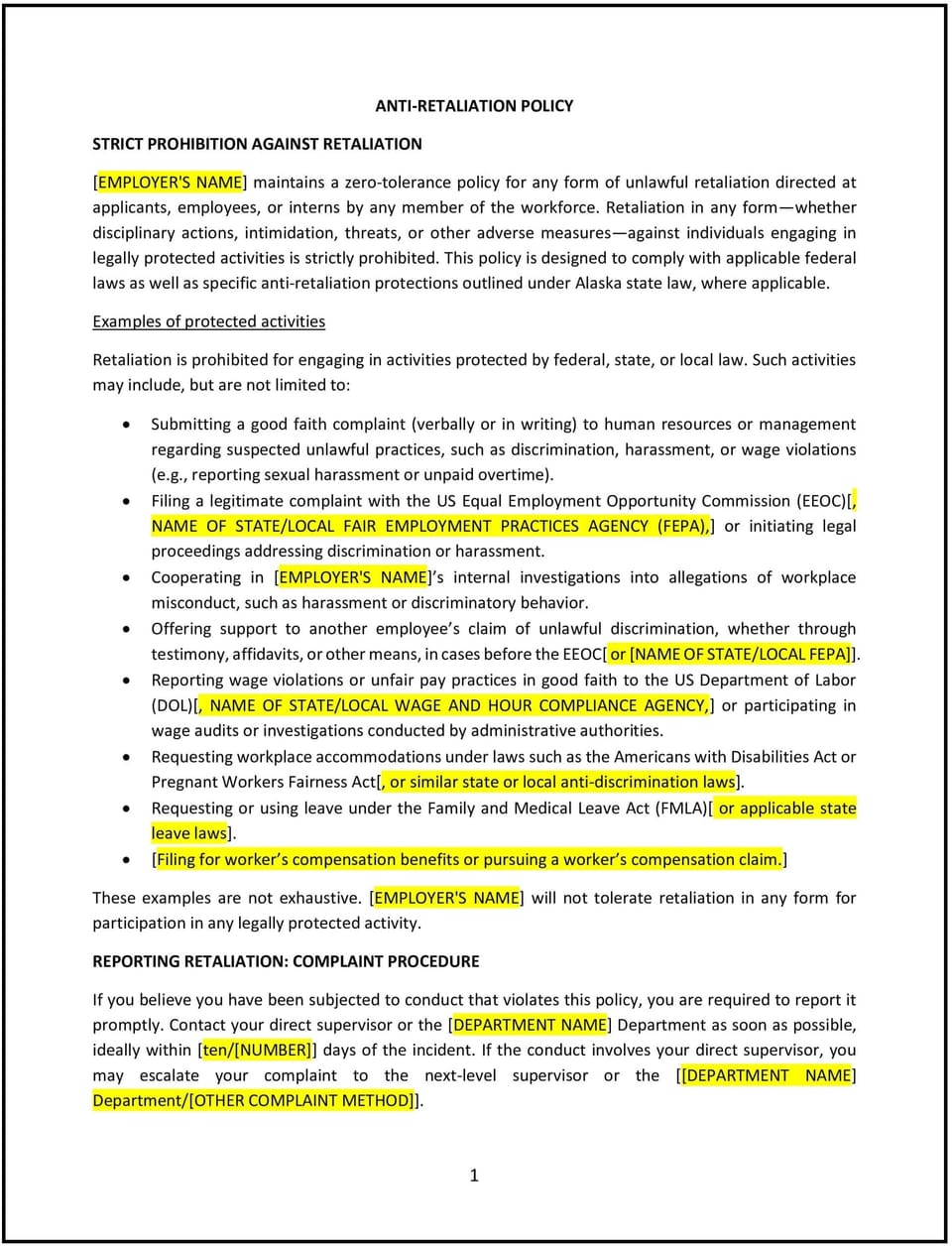Anti-retaliation policy (Alaska): Free template

Anti-retaliation policy (Alaska)
In Alaska, an anti-retaliation policy is essential to protect employees from unfair treatment after they report violations, make complaints, or participate in investigations regarding workplace issues. This policy ensures that employees can raise concerns about discrimination, harassment, or illegal activities without the fear of retaliation. By establishing clear guidelines on retaliation, businesses can create a safer, more supportive work environment that encourages open communication and compliance with laws.
Retaliation can manifest in many ways, including unjustified negative actions such as termination, demotion, harassment, or any other form of discrimination against an employee who engages in protected activities. This policy aims to prevent such behavior, protect employees' rights, and demonstrate the company's commitment to ethical business practices and legal compliance.
How to use this anti-retaliation policy (Alaska)
- Explain the importance: Highlight how anti-retaliation policies can help ensure a fair and supportive workplace where employees can report concerns without fear of negative consequences.
- Reflect local diversity: Ensure the policy reflects the specific workforce dynamics in Alaska, particularly regarding remote work environments and industries with heightened risks of retaliation.
- Adapt to your company: Tailor the policy to fit your organization's size, structure, and operational needs. Define reporting procedures and any specific protections relevant to your industry.
- Ensure clarity: Make the policy accessible to all employees, ensuring they understand their rights and the steps they can take if they believe they are being retaliated against.
- Promote accountability: Train managers and supervisors on how to handle retaliation complaints and the importance of maintaining a retaliation-free environment.
Benefits of using an anti-retaliation policy (Alaska)
A well-defined anti-retaliation policy helps organizations in Alaska in numerous ways. Here’s how it helps:
- Protects employees' rights: Ensures that employees can report misconduct or participate in investigations without fear of adverse consequences.
- Promotes legal compliance: Helps businesses comply with federal and state laws that prohibit retaliation, reducing the risk of lawsuits and penalties.
- Fosters transparency and trust: Encourages open communication and reporting of workplace issues, contributing to a positive company culture and stronger employee relations.
- Enhances employee retention: Employees who feel safe and valued are more likely to stay with the company, reducing turnover and recruitment costs.
- Reduces legal risks: By implementing the policy, companies mitigate the risk of retaliatory actions that could lead to costly legal battles and reputational harm.
Tips for using an anti-retaliation policy (Alaska)
- Be clear and specific: Ensure the policy defines retaliation in a way that employees can easily understand. Clarify what constitutes retaliation and provide examples.
- Ensure confidentiality: Make sure employees feel safe when reporting retaliation, knowing that their claims will be handled confidentially.
- Provide multiple reporting options: Offer employees several ways to report retaliation, such as through HR, an anonymous hotline, or directly to senior management.
- Act quickly: Promptly investigate any retaliation claims to prevent further harm and demonstrate the company’s commitment to resolving issues fairly.
- Train management: Ensure that all supervisors and managers are trained to handle retaliation complaints appropriately and to foster an inclusive, safe workplace.
Q: Why is an anti-retaliation policy important for my business?
A: It protects employees’ rights and fosters trust, encouraging them to report issues like harassment or illegal activities without fear. This creates a transparent and ethical work environment.
Q: How does this policy help reduce legal risks?
A: By outlining clear protections and procedures, the policy supports compliance with federal and state laws, helping businesses avoid lawsuits or regulatory fines.
Q: What should I include in my anti-retaliation policy?
A: Include clear definitions of retaliation, examples of prohibited actions, reporting procedures, and protections for employees who make complaints or participate in investigations.
Q: How do I ensure employees feel safe reporting retaliation?
A: Provide multiple reporting channels, ensure confidentiality, and promote a culture where employees trust the company to handle complaints fairly and promptly.
Q: What actions should I take if retaliation occurs?
A: Investigate the claim thoroughly, address the issue with appropriate disciplinary actions, and reinforce the policy through additional training or updates.
This article contains general legal information and does not contain legal advice. Cobrief is not a law firm or a substitute for an attorney or law firm. The law is complex and changes often. For legal advice, please ask a lawyer.


